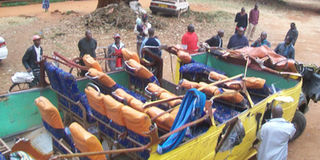Bid to avert festive season carnage on roads

The ill-fated Kathonzweni - Kangundo bound bus that killed 23 people in a road accident on August 20, 2011. Photo/BOB ODALO
Motorists and other road users have been urged to take extra care during the festive season.
According to the National Road Safety Council, most accidents occur during this period as it involves a lot of travel and alcohol intake.
The Traffic Police Department has also advised Kenyans to stay at home, if possible. It calls on drivers, pedestrians and passengers to strictly observe traffic rules.
The police website lists 78 points on Kenya’s roads considered blackspots.
Traffic enforcement records show rampant indiscipline and non-compliance with traffic rules by drivers, cyclists, pedestrians and passengers.
This has been blamed partly on poor knowledge of the Highway Code, impunity, poor infrastructure, corruption and unpredictable weather.
Police statistics indicate that Kenya loses nearly 3,000 people a year to road crashes, with 10 times that number sustaining injuries.
The National Road Safety Action plan intends to reduce deaths on the roads by 50 per cent before 2014.
Human error is considered the greatest cause of accidents, with over 85 per cent caused by speeding, reckless or drunk driving and failure to observe traffic rules.
Other causes are mechanical problems at 11 per cent while poor weather accounts for just four per cent.
The main victims of road crashes in Kenya have been pedestrians, accounting for 41.4 per cent of those killed, followed by passengers, cyclists and drivers.
To curb the carnage, the Association of Safe International Road Travel plans to roll out a campaign to educate Kenyans on road safety.
Executive director Bright Orwaya said the programme will bring on board the media, police, public transport operators, Transport Licensing Board and National Road Safety Council (NRSC).
However, the NRSC admits that past efforts to carry out deliberate awareness campaigns through the media, private sector and public forums have not had the desired impact.
Meanwhile, three local businessmen have made efforts to help police manage congestion on the city’s busiest roads.
Mr Garana Bele, Mr Idle Ibrahim, and Mr Omar Said have set up the Community Traffic Society of Kenya to reduce the burden on Nairobi’s traffic police.
The (CTSK) will train citizen teams to direct traffic and raise awareness on road rule.
The community-based initiative will be funded through corporate donations.
CTSK’s first sponsor, Supaloaf, has committed itself to funding 40 staff at a monthly salary of Sh20,000 each.
Recruits will receive one week of training in traffic control and customer service, then will be sent into the field in teams of two to manage vehicle flow at about 20 locations throughout the city.



